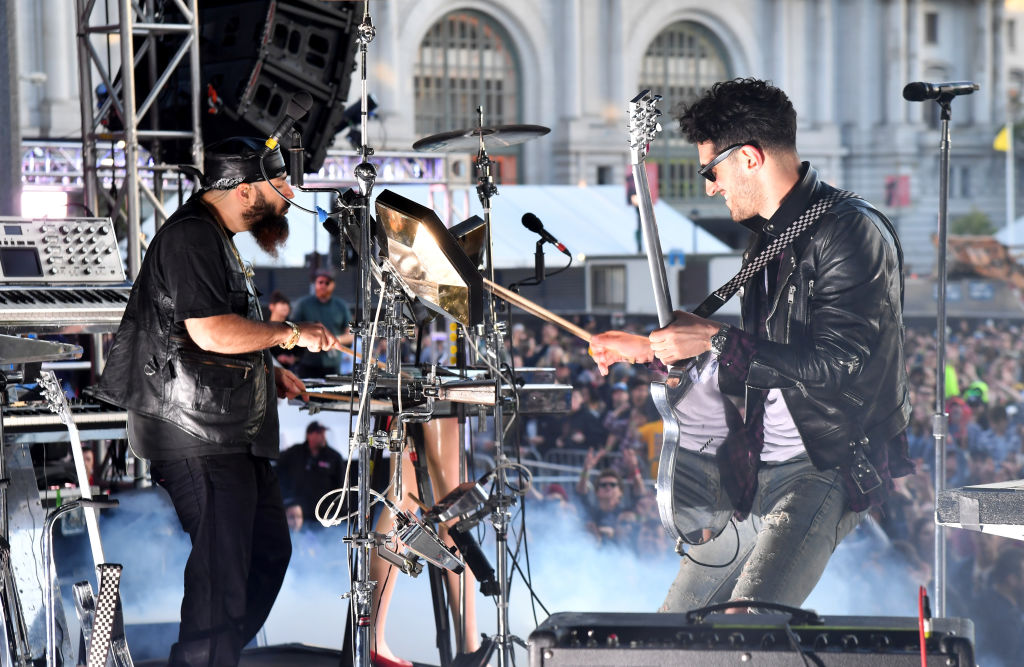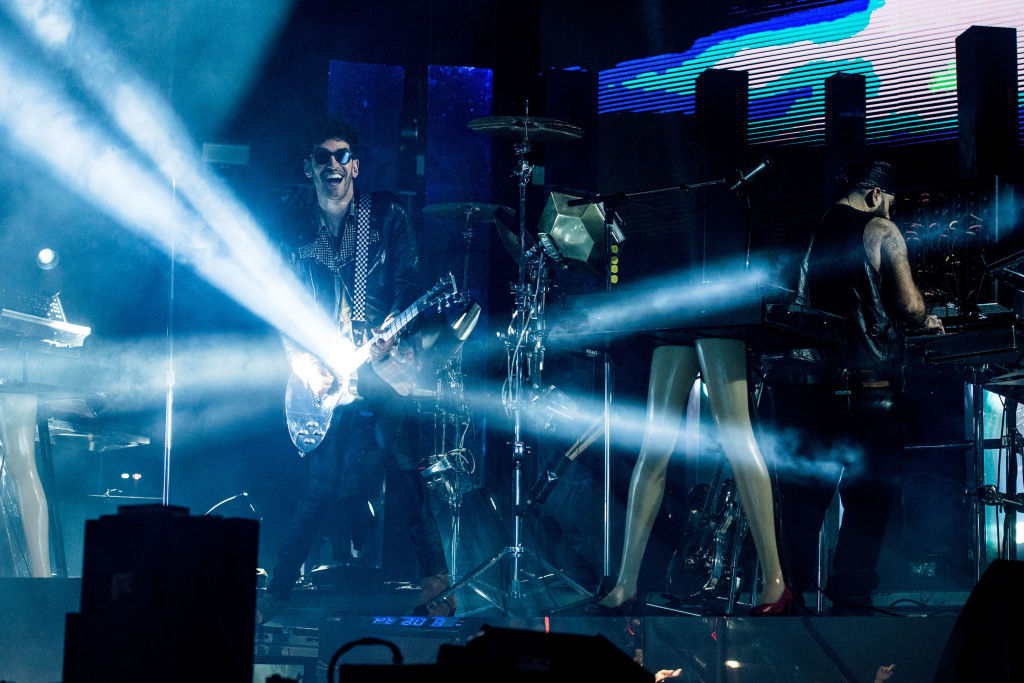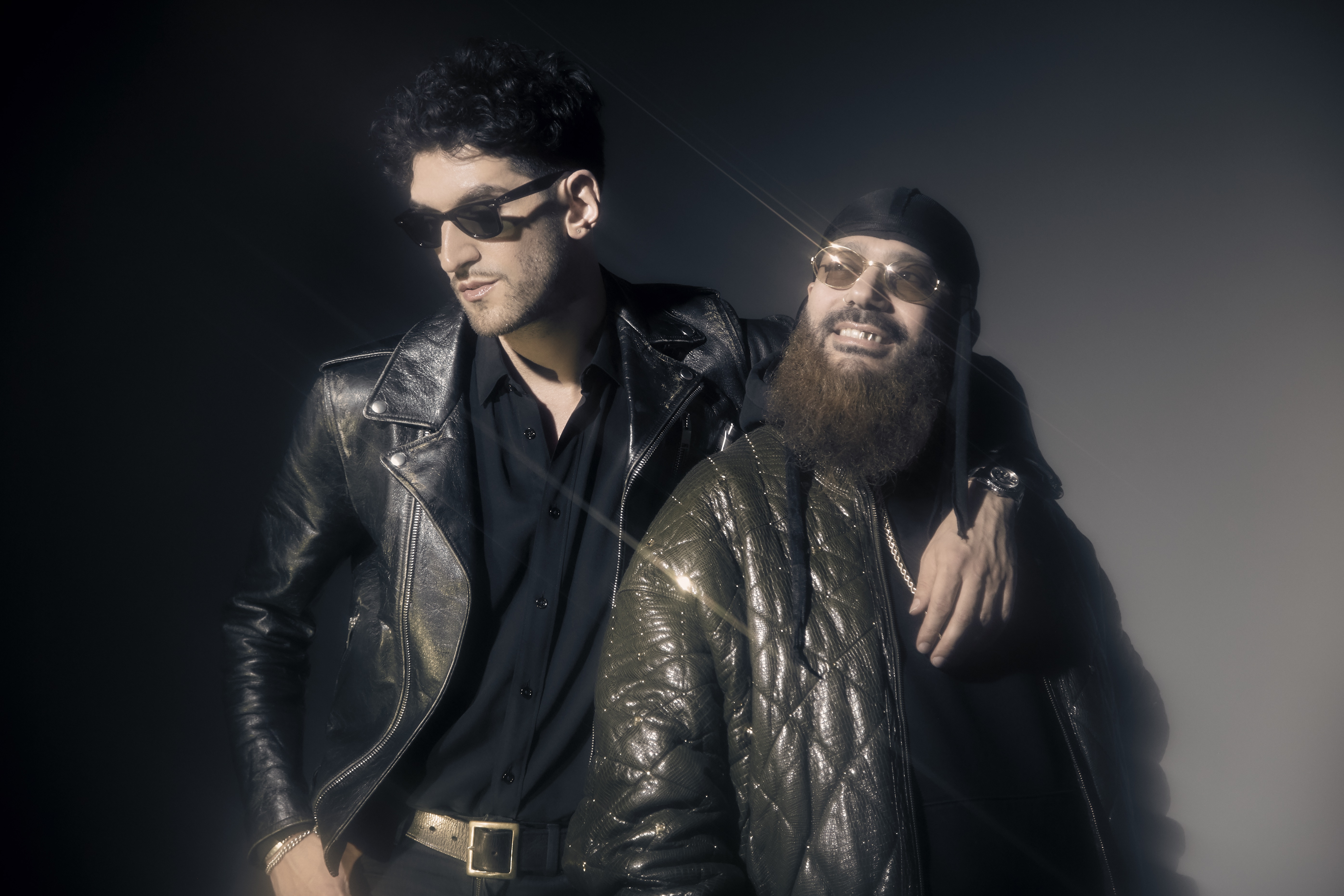A group of beautiful people in ugly shoes is a fashion party, and tonight’s is inside a galleria-like office grafted onto a discount department store. There are no desks, just a few sofas. It’s a place where people in head-to-toe pink camo mingle with those in bondage gear, and guests approach apropos of nothing to assure you they’re “big in Japan.” There’s free Jäger, of course, which surely helped motivate some of these revelers to gather in Manhattan’s desolate, after-hours Financial District.
Nothing happens for an hour, and then David “Dave-1” Macklovitch and Patrick “P-Thugg” Gemayel of funk-pop duo Chromeo emerge to replace the DJ. They play their new album Head Over Heels straight through, Macklovitch lip-syncing in a cream suit jacket, Gemayel making exacting, imperceptible adjustments to the mix beneath a red leather cap. At 11, the party’s over. “We’re on Stephen Colbert tonight,” Macklovitch tells the crowd. Chromeo’s night is only beginning, and they’re not just cool but cold sober. “We’ll do photos!”
A week later, Macklovitch is flying solo at his publicist’s office uptown. Gemayel is en route to Columbus, Ohio with Chromeo’s tour bus, and I wonder if he prefers it that way: His partner has always done more talking. Perhaps the best P-Thugg interview isn’t an interview at all, but Fact magazine’s video tour of the studio Chromeo built in Los Angeles to make the new record. Watch Gemayel show off the USB port he’s installed on a vintage sampler while his partner reminisces about making beats on Pentium II, and the anachronistic technological dynamic underlying Chromeo’s slickly retro aesthetic and lacquered modern production becomes clear.
Macklovitch evicts “cool” from his vocabulary right away (“it’s kind of an empty term”), but he can’t escape its signifiers. “Lo and behold, the same Williamsburg cafe that played Fleet Foxes in 2007-8 is now playing Evelyn ‘Champagne’ King or Mtume records, you know?” he says. “That kind of ‘80s funk and boogie has infiltrated the hipster cognoscenti, and I’m not saying we had something to do with that because I’d never take that credit, but we definitely were one of the first bands to champion that kind of music and to say, ‘This is not tacky, this is interesting, because it’s plural.’”
Plural?
“Rick James wears red leather pants, but he is a lyrical and musical genius and he contributed things to music. In another way people like Frank Zappa did that too. I like being on that edge of, ‘Are they serious? Are they joking? Are they earnest? Are they tongue-in-cheek? Are they music nerds or are they just two goofballs?’ I like playing with these opposites. P and I cultivate that.”

Head Over Heels wants it both ways more badly than ever. The title is ditzy but the music is bold, punching up the warmest and most nostalgic of the sounds tested on 2014’s White Women to a full-bodied strut. The fundamentals are still in place: thick synth bass, the gurgle of Gemayel’s talk box, elements Chromeo appropriated from the ’70s and ’80s with a professorial flourish and a tongue-in-cheek levity that—despite superficial similarities—suggested they didn’t share the electroclash era’s burn-bright-fade-fast priorities. In the 15 years since “Needy Girl” launched their career they’ve worked to channel the kind of records their first influences drew on for samples, and if the final product still feels more worked-over than “live,” it is livelier. In retrospect, there was a lot of room for improvement: As Chromeo have grown to embrace the festival-centric economy of the mid-tier dance act, each subsequent album has sounded less brittle, more confident and joyful. Heels, Macklovitch says more than once, is a “balls-out statement record,” an unrestrained celebration of Chromeo’s favorite classic funk and the way it makes them feel, which is like having a good time.
“Do you kind of have to know about funk music to appreciate Chromeo or can you just be the person on the right at this festival jumping up and down and enjoying it?” he asks. “We want both.” The quickest way to win both crowds at once is to admit you’ve got a sense of humor about trying it. “In a song like ‘Room Service’ or ‘Juice’ or ‘Slumming It,’ every lyric is at the service of the concept,” he continues. “It might be a little bit more zinger-heavy, but that’s what made us laugh. If we can make people dance and make people smile at the zingers—and I see when we play those songs live, people love singing the lyrics—I’m cool with that.” If an outrageous metaphor about thirst and a juice press can work up some sincere respect for people who wear leather pants, maybe it’s worth it.
But aside from their leg-baring turn on “Juice,” Chromeo have been less present on their own singles this time around, anchoring the new album release with “Must’ve Been,” prominently featuring DRAM, and “Bedroom Calling, Pt. 2,” their much sought-after collaboration with The-Dream. Rising singer Amber Mark shines on “Just Friends,” and while Chromeo have never quite had what you could call a mainstream party jam, verses from Stefflon Don and French Montana on “Don’t Sleep” make it seem they wouldn’t mind trying. An electronic pop album stacked with vocal features is the norm these days, though not all of them boast corresponding studio talent: Neo-soul Renaissance man Raphael Saadiq on “Just Friends,” The Time guitarist Jesse Johnson on “Must’ve Been,” pop and R&B producer Rodney “Darkchild” Jerkins on “Don’t Sleep.” It’s never been more obvious that, while Chromeo aim to please, they’d also like to be taken seriously. But then there are the goofs: mandatory sax solos, the fake airline, a 45 minute long version of “Must’ve Been.” The shaved legs and skirts of Heels are a winking apology for years propped up on women’s legs, and a not-so-subtle flex to prove nascent wokeness hasn’t threatened their manhood.
“I think the persona in this record is more fragile than in White Women and even in a song like ‘Over Your Shoulder,’” Macklovitch says, because he’s worried that what sounded chivalrous in 2014 makes him a jerk now: “I have a problem with ‘Over Your Shoulder’ because, looking back, I find it mansplain-y. When I’m like, ‘You see your problems of self-esteem / Could be self-fulfilling prophecies’—so, ‘Talk to me, I got the answers, girl. You’re hot, you should have confidence.’ Like who am I to tell you that? No!”
Chromeo’s intention is to find the humor in overcorrection. “On this record it’s like, ‘You’ve got the juice,’ ‘Count Me Out,’ you’re a freethinking sexually liberated person, I can’t handle it, do I need to take a bank loan? Ahh!” he says. “The neurosis is more dialed up.” If there’s still a trace of Fancy Footwork’s dancefloor-prowling irony dandy tucked into “Don’t Sleep,” there are two songs about hapless boyfriends (“Count Me Out,” “Slumming It”) losing touch with reality (“Must’ve Been,” “One Track Mind”) as they acquiesce to financial humiliation (“Bad Decision” and “Slumming It” again). It’s as performative as anything Chromeo have done before, and more fun. Where White Women’s strong first half covered for an unwieldy second, Heels holds its own through a home stretch that’s arguably an upgrade on the opening.
Just don’t think Chromeo are going to let guilt or artistic maturity stop them performing a song like “Sexy Socialite,” or even “Needy Girl.” To hear Macklovitch tell it, the powerhouse live show that’s made them festival-circuit regulars is a precisely calibrated thing, and frontloading it with too much new material risks upsetting the balance of a set engineered for replay value. “For Chromeo right now, what works is something like a figure skating routine, where you perfect one thing, you try to make it as flawless as you can, and then you just repeat it until it’s time to build a new routine,” he says. On the night of Heels’ release, the show is seventy percent back catalog and the stars are precision choreographed to lighting displays that would overpower another act. Macklovitch plays a chrome guitar, and when the spotlight hits his pickups the beam scatters like a disco ball.

The new songs will find their way into the set eventually; the secret to Chromeo’s unlikely sustained success is the ability to dial in new attitudes without surrendering the stylistic line, and that tends to leaves them vulnerable to misinterpretation. Macklovitch is a guy who reads his press, and if it’s helping him to stay humble, he’s paying for the privilege. Head Over Heels earned Chromeo their lowest-scored and least flattering Pitchfork review to date. “As crazy as it is, I literally value that point of view. Of course I don’t like reading it,” he says. “In the case of a listener like that, the lowbrow definitely overpowered the highbrow and it made him uncomfortable. P loves it. P’s like, ‘I want to offend people like that, good!’ I don’t love it, but it’s a point of view.”
He’s trying to be high-minded, but it’s bothering him. “Are you planning a takedown piece?” he asks, squirming, not quite buying the idea that I wouldn’t waste my time. Neither of Chromeo drink, but I wonder how he copes. Any personal vices? “Stress,” he responds immediately, then pauses to correct course. “I don’t know if it’s a vice, but it is a danger. Self-doubt.”
Not that you’d know it from the final quarter of Head Over Heels, between the starry-eyed ballad “Bedroom Calling, Pt. 1” and The-Dream’s scene-stealing seduction on “Bedroom Calling, Pt. 2.” Macklovitch describes this material as a continuation of White Women’s Solange duet “Lost on the Way Home”—more sincere passion, less goofing. The suite was inspired in part by The-Dream’s own untouchable, never officially released nine-and-a-half-minute epic “Body Work/Fuck My Brains Out,” still nastier by an order of magnitude. In the sleek, PG-13 rated world of Chromeo, the finishing touch is “Room Service,” a fantasy affair of a hotel weekend spent enjoying the rarest of modern luxuries: undivided attention. “I listen to it all the time. It relaxes me,” Macklovitch says. “It’s three chords, right, so it’s hypnotic.” Almost the entire second half of the song is given over to sex-glow groove and a refrain that could be their people-pleasing manifesto: “Whenever you’re down, we get you on your feet.”
“It’s not even funny, it’s sincere,” he says. “Anyone who’s had a relationship knows what it is to be like, ‘Fuck that, I’m not going out. Take the robe. Oh cool, they have l’eau Labeaux? I’m stealing this.’ And also, I suffer from anxiety! Sometimes I don’t wanna leave!” His voice rises, dapper façade beginning to crumble. “Under the quirky room service shit there’s actually a tragic, anxious person being like, ‘I don’t want to see my friends. Like I don’t. Can we not? Can you tell Michael that we can’t? I can’t. I just can’t. Put Netflix on, stay in the robe. I’m not going anywhere.’”





